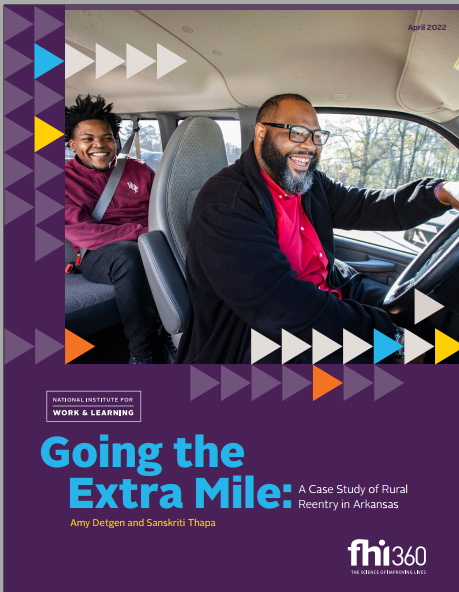FHI 360’s National Institute for Work and Learning (NIWL) provides support to education providers, workforce trainers, and their local partners to improve education and employment outcomes for youth aged 18-24 involved with the criminal legal system. Using a statistical lens, this document details the impact of NIWL’s five U.S. Department of Labor-funded Compass Rose Collaborative re-entry programs operating between 2017 and 2024.
Audience: Young Adult
For Second Chance month, we spoke to Olivia Murphy, who serves as senior career coach (and now youth program manager) for The Spot: Young Adult Opportunity Center in Louisville, KY. The story highlights how KentuckianaWorks navigates the challenges of life after incarceration, and how their impact encourages people to embrace second chances.
Read the full story to learn more.
As part of our Apprenticeship Programs, FHI 360 is partnering with New Ways to Work to develop a Substance Use Disorder and Mental Health Counselor Apprenticeship. This apprenticeship equips direct services employers with the resources they need to recruit workers with life experiences relevant to the communities they serve.
Through a combination of paid on-the-job learning (OJL) and coursework, apprentices will gain an alternative, rigorous, and rewarding point of entry into a profession that traditionally requires post-secondary education. Upon completion, program participants receive a national credential from the U.S. Department of Labor. To learn more, read our fact sheet.
As part of our Apprenticeship Programs, FHI 360’s Peer Support Specialist Apprenticeship partners with the Public Works Alliance (PWA) to train apprentices who have experienced recovery from personal and societal challenges. These include substance use disorder, PTSD, the re-entry process, and many other challenges. This shared experience enables apprentices to support others who are going through similar hardships.
By partnering with FHI 360, employers can use this apprenticeship to reinforce a holistic approach in their mental health services. Apprentices who complete their apprenticeship earn a national credential from the U.S. Department of Labor (DOL). To learn more, consult our fact sheet.
FHI 360’s NIWL Apprenticeships bring together experts in workforce development to expand existing nationally registered apprenticeship programs (RAPs), such as the Youth Development Practitioner Apprenticeship (YDPA) and develop new opportunities within the care economy such as youth services, peer support, substance-use counseling, and mental health counseling.
Upon completion, apprentices receive a nationally recognized credential from the U.S. Department of Labor. Read the fact sheet to learn more.
“To me, that’s the biggest message with this apprenticeship — this is the perfect way to learn how to change lives.”
As we celebrate National Apprenticeship Week 2024, we highlight two Lake County Youth Development Practitioner Apprentices who use their work to break the cycles of trauma and heal their communities: Luis Garcia Jr. and Jenessa Armstrong. Click here to read about their journeys in becoming the person they wanted to have in their corner growing up.
The Careers in Trade guide is an interactive tool that will guide you through numerous trade-related career pathways. You will be provided the opportunity to explore careers in trade, various certification options, an insight into the roles and responsibilities of multiple careers in trade, and connection activities bridging academics and trades.
Going the extra mile: A case study of rural reentry in Arkansas provides an exploration of a rural community in southeast Arkansas that takes a unique, individualized approach to reentering young adults ages 18-24. The received wisdom on rural reentry is that it is generally more difficult than reentry in an urban setting. Phoenix Youth and Family Services, which serves a rural part of Arkansas, has excelled on key outcomes as part of FHI 360’s Compass Rose Collaborative (CRC)1, a project funded by the U.S. Department of Labor to improve the education and employment outcomes of young adults,
ages 18 through 24, after involvement in the U.S. criminal justice system.
Phoenix Youth and Family Services provides wraparound support services to its participants to help juveniles, young adults, and families secure a safe, healthy, and strong life
As part of NIWL’s Apprenticeship Programs, the Youth Development Practitioner Apprenticeship trains apprentices in youth-supporting fields through 2,000 hours of on-the-job learning and 165 hours of coursework where they learn skills such as positive youth development, coaching, career case management and more. Upon completing the program, apprentices receive a nationally recognized credential from the U.S. Department of Labor. To learn more, read this fact sheet.









